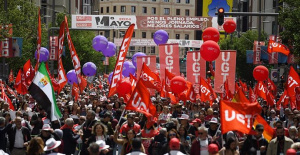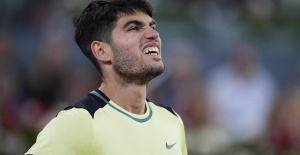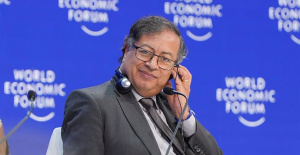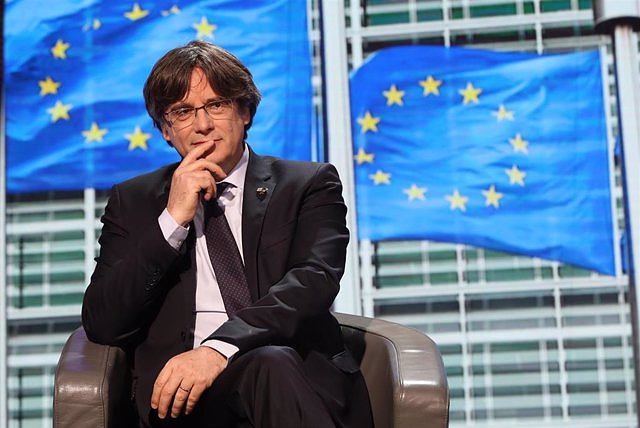The general opinion among jurists is that the Constitution does not allow amnesties as demanded by the former Catalan president
MADRID, 25 Jul. (EUROPA PRESS) -
Former Catalan president Carles Puigdemont has become the key for Pedro Sánchez to repeat at La Moncloa, given the necessary support from Junts for a new investiture. Thus, the judicial future of the pro-independence leader once again gains political relevance, although the road to a hypothetical pardon would be long, since it would require a prior conviction, since the possibility of an amnesty raises constitutional doubts.
Puigdemont's judicial situation at the moment is that of a defendant in absentia for crimes of disobedience --punished with a fine of 3 to 12 months and disqualification from 6 months to 2 years-- and aggravated embezzlement --punished with between 6 and 12 years in prison-- for the illegal referendum held in Catalonia on October 1, 2017.
European courts have issued two key decisions in recent months that bring Spain closer. On the one hand, the CJEU ruled on January 31 that judicial authorities that receive Euro-warrants cannot refuse to execute them based on alleged violations of fundamental rights, unless systemic and generalized deficiencies in Spain are demonstrated. And, on the other, the TGUE lifted on July 5 the immunity that he enjoyed as a precautionary MEP.
These two decisions, added to the fact that his new prosecution - which the instructor of the 'procés', Pablo Llarena, had to review due to the criminal reform that repealed sedition and modified embezzlement - has been confirmed by the Supreme Court, have led the Prosecutor's Office to request this week that the magistrate reactivate the European and international search and capture orders against Puigdemont.
Although, as on previous occasions, Llarena issues a new European arrest and surrender order (OEDE) against Puigdemont, the legal sources consulted by Europa Press warn that his arrival in Spain would not be far from immediate, since it must pass the filter of the Belgian courts, which until now have always put up problems.
In this scenario, in which the Belgian judges use "banal reasons" for not complying with the OEDE, the magistrate could have to raise a new question for a preliminary ruling to the CJEU on the scope of the Euro-warrants, with the consequent delays. The questions resolved by the Court of Justice of the EU last January were raised in March 2021.
Once in Spain, either after this process or voluntarily, Llarena would have to take a statement from him with the sole purpose of notifying him of his prosecution for disobedience and embezzlement, to later conclude the summary and, where appropriate, advance to trial.
In the meantime, the magistrate could agree to the provisional detention of Puigdemont, since embezzlement is a crime punishable by more than two years in prison, the minimum required. Among the factors to be assessed, the law indicates the risk of flight and recidivism.
The granting of pardon, which those sentenced by the 'procés' in October 2019 already partially received in June 2021, is only feasible in the event that they have been tried and convicted.
And it is that the Pardon Law establishes that "inmates of all kinds of crimes may be pardoned from all or part of the penalty they have incurred", expressly excepting "criminally prosecuted who have not yet been convicted by final sentence".
In addition, it should be remembered that the pardon entails a series of procedures that involve obtaining reports from penitentiary institutions, the sentencing court or the Prosecutor's Office until the Government decides on the measure of grace.
Thus, the pardon would be the last box in a journey that could take years. Puigdemont's lawyer, Gonzalo Boye, assured this Tuesday in Rac1 that the former president is not looking for a personal solution, defending that amnesty is the "most impeccable and clean way" to solve the "problem".
However, the general opinion in the doctrine is that the Constitution does not allow amnesties, although there are minority positions that defend the opposite, according to experts consulted by Europa Press.
The last Amnesty Law was approved in 1977, as part of the political reform promoted by the Government of Adolfo Suárez, to forgive "all acts of political intent, whatever their result, classified as crimes and misdemeanors" until then.
With the entry into force of the Constitution, of 1978, its article 62 included the possibility of "exercising the right of grace in accordance with the law", qualifying that in no case may "general pardons" be granted.
The doctrine has understood in a majority way that, by expressly collecting the pardon but not the amnesty, and prohibiting general pardons, the Constitution does not admit amnesties. On the other hand, there are jurists who believe that if a pardon can be granted -which means pardoning a sentence-, an amnesty can be granted -which implies pardoning without the need for a prior judicial process-. However, experts predict that an eventual amnesty would end up in the Constitutional Court (TC).

 Exploring Cardano: Inner Workings and Advantages of this Cryptocurrency
Exploring Cardano: Inner Workings and Advantages of this Cryptocurrency Seville.- Economy.- Innova.- STSA inaugurates its new painting and sealing hangar in San Pablo, for 18 million
Seville.- Economy.- Innova.- STSA inaugurates its new painting and sealing hangar in San Pablo, for 18 million Innova.- More than 300 volunteers join the Andalucía Compromiso Digital network in one month to facilitate access to ICT
Innova.- More than 300 volunteers join the Andalucía Compromiso Digital network in one month to facilitate access to ICT Innova.-AMP.- Ayesa acquires 51% of Sadiel, which will create new technological engineering products and expand markets
Innova.-AMP.- Ayesa acquires 51% of Sadiel, which will create new technological engineering products and expand markets COMUNICADO: Energy Transitions Commission (ETC) Urges Government and Industry Collaboration to Overcome Perceptions of Offshore Wind
COMUNICADO: Energy Transitions Commission (ETC) Urges Government and Industry Collaboration to Overcome Perceptions of Offshore Wind UGT and CCOO demand the regeneration of democracy, better salaries and a reduction in working hours
UGT and CCOO demand the regeneration of democracy, better salaries and a reduction in working hours Alcaraz gives up his reign in Madrid against Rublev
Alcaraz gives up his reign in Madrid against Rublev Petro announces that Colombia will break diplomatic relations with Israel
Petro announces that Colombia will break diplomatic relations with Israel How Blockchain in being used to shape the future
How Blockchain in being used to shape the future Not just BTC and ETH: Here Are Some More Interesting Coins Worth Focusing on
Not just BTC and ETH: Here Are Some More Interesting Coins Worth Focusing on Ivace and promotes a less invasive device for the early detection of prostate cancer
Ivace and promotes a less invasive device for the early detection of prostate cancer Valencia unanimously approves the ordinance to allocate spaces to test innovative initiatives
Valencia unanimously approves the ordinance to allocate spaces to test innovative initiatives UPV researchers promote a paid master's degree as a "talent factory" in integrated photonics
UPV researchers promote a paid master's degree as a "talent factory" in integrated photonics A spin-off of the UV works on obtaining high-resolution 3D biomedical images in real time
A spin-off of the UV works on obtaining high-resolution 3D biomedical images in real time A million people demonstrate in France against Macron's pension reform
A million people demonstrate in France against Macron's pension reform Russia launches several missiles against "critical infrastructure" in the city of Zaporizhia
Russia launches several missiles against "critical infrastructure" in the city of Zaporizhia A "procession" remembers the dead of the Calabria shipwreck as bodies continue to wash up on the shore
A "procession" remembers the dead of the Calabria shipwreck as bodies continue to wash up on the shore Prison sentences handed down for three prominent Hong Kong pro-democracy activists
Prison sentences handed down for three prominent Hong Kong pro-democracy activists ETH continues to leave trading platforms, Ethereum balance on exchanges lowest in 3 years
ETH continues to leave trading platforms, Ethereum balance on exchanges lowest in 3 years Investors invest $450 million in Consensys, Ethereum incubator now valued at $7 billion
Investors invest $450 million in Consensys, Ethereum incubator now valued at $7 billion Alchemy Integrates Ethereum L2 Product Starknet to Enhance Web3 Scalability at a Price 100x Lower Than L1 Fees
Alchemy Integrates Ethereum L2 Product Starknet to Enhance Web3 Scalability at a Price 100x Lower Than L1 Fees Mining Report: Bitcoin's Electricity Consumption Declines by 25% in Q1 2022
Mining Report: Bitcoin's Electricity Consumption Declines by 25% in Q1 2022 Oil-to-Bitcoin Mining Firm Crusoe Energy Systems Raised $505 Million
Oil-to-Bitcoin Mining Firm Crusoe Energy Systems Raised $505 Million Microbt reveals the latest Bitcoin mining rigs -- Machines produce up to 126 TH/s with custom 5nm chip design
Microbt reveals the latest Bitcoin mining rigs -- Machines produce up to 126 TH/s with custom 5nm chip design Bitcoin's Mining Difficulty Hits a Lifetime High, With More Than 90% of BTC Supply Issued
Bitcoin's Mining Difficulty Hits a Lifetime High, With More Than 90% of BTC Supply Issued The Biggest Movers are Near, EOS, and RUNE during Friday's Selloff
The Biggest Movers are Near, EOS, and RUNE during Friday's Selloff Global Markets Spooked by a Hawkish Fed and Covid, Stocks and Crypto Gain After Musk Buys Twitter
Global Markets Spooked by a Hawkish Fed and Covid, Stocks and Crypto Gain After Musk Buys Twitter Bitso to offset carbon emissions from the Trading Platform's ERC20, ETH, and BTC Transactions
Bitso to offset carbon emissions from the Trading Platform's ERC20, ETH, and BTC Transactions Draftkings Announces 2022 College Hoops NFT Selection for March Madness
Draftkings Announces 2022 College Hoops NFT Selection for March Madness























